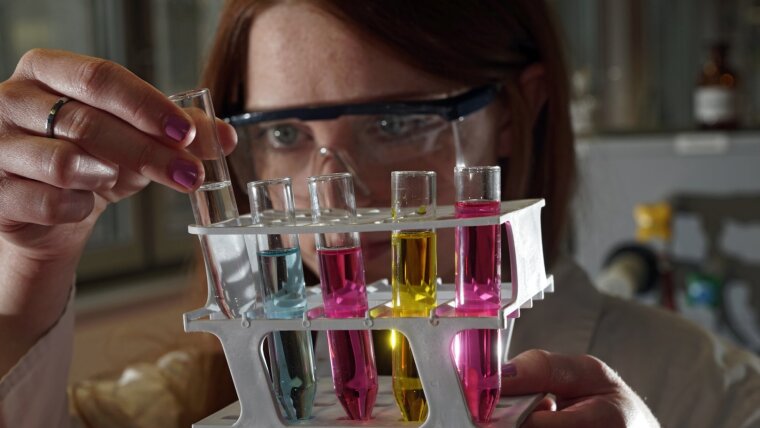
In the public eye, "Good Research Practice" is often equated with cases of plagiarism in doctoral theses. However, the topic covers a much broader spectrum of behavior in research:
- the correct handling of data (including collection, documentation, ownership and storage),
- the publication process and authorship,
- responsible supervision,
- scientific cooperation,
- disclosure of conflicts of interest,
- appropriate handling of interpersonal conflicts.
Scientific misconduct occurs, for example, when data is invented or falsified, intellectual property is infringed (theft of ideas or plagiarism) or the research activities of others are sabotaged.
Statutes for Safeguarding Good Research Practice
Friedrich Schiller University Jena strives to keep alive and strengthen awareness of the principles of good research practice among established researchers, as well as to communicate them to students and early career researchers as a self-evident requirement of research work at an early stage and on an ongoing basis.
On 11 July 2023, the Senate of the University of Jena adopted the statutes for safeguarding good research practice (statutes GRP) on the basis of the "Guidelines for Safeguarding Good Research Practice" of the German Research Foundation (DFG).
The purpose of these statutes is to make clear that the University does not accept research misconduct since this hinders research advancement, undermines public trust in research, and destroys the trust of researchers amongst themselves. Friedrich Schiller University Jena will investigate every suspected case of research misconduct within the University. If, after clarification of the facts, a suspected case of misconduct is confirmed, appropriate measures will be taken in each individual case within the scope of possibilities at the University’s disposal.
The statutes for safeguarding good research practice at the University of Jena can be found herepdf, 349 kb.
Ombudspersons
The ombudspersons receive reports of suspected misconduct and examine confidentially whether there are sufficiently concrete indications of actionable scientific misconduct. If the suspicion is confirmed, the ombudsperson conducts a preliminary investigation. As part of this preliminary examination, the ombudsperson obtains a statement from the accused person and carries out investigations. For example, they may request, obtain and analyse documents, obtain and secure other evidence, obtain further statements or - if necessary - obtain external expert opinions.
If the preliminary review does not reveal sufficient suspicion of actionable scientific misconduct, the ombudsperson shall discontinue the proceedings. If there is sufficient suspicion, the ombudsperson will transfer the preliminary review to a formal investigation by the Commission for Good Scientific Practice. In detail: Section IV of the GWP Statutes - Procedures and Measures.
Alternatively, members and affiliates of the University have the option of contacting the nationally active "Ombuds Committee for Academic Integrity in GermanyExternal link".
Ombudspersonen as per Section §19 of the GRP
Humanities:
Professor Caroline Rosenthal (V: Professor Iris WinklerExternal link)
Social sciences, law and economics:
Professor Stefan SchweinbergerExternal link (V: Professor Nils Boysen)
Natural sciences, mathematics, computer science:
Professor Ivan VilotijevicExternal link (V: Professor Kai LawonnExternal link)
Life Sciences:
N.N. (V: Professor Britt WildemannExternal link)
Committee for Safeguarding Good Research Practice
The Committee for Good Scientific Practice is responsible for the formal investigation of suspected scientific misconduct. The committee only becomes active after a preliminary examination by an ombudsperson. The committee conducts hearings with the person providing the information, the accused person and, if necessary, other persons. It examines whether scientific misconduct has been proven according to the usual rules of free evaluation of evidence and determines this by majority vote. Finally, the committee submits a report to the Executive Board, which may also contain proposals for sanctions. The Executive committee decides at its own discretion whether scientific misconduct has been established and whether and which sanctions and measures will be imposed on the accused person.
Members of the Committee as per Section § 21 of the GRP
Professor Thorsten Heinzel (Chairman)
Professor Volker Michael Jänich (D: Professor Michael Brenner)
Professor Bettina Löffler (D: Professor Christoph Englert)
Professor Ulrike Kaiser (D: Professor Ilona Croy)
qua office: Professor Thomas Pertsch (Vice President for Research)
Seminars on good research practice
The Graduate Academy regularly offers seminars on the topic of "Good Scientific Practice". In these workshops, the various conflicts that arise in everyday research are discussed on the basis of case studies. We recommend that you attend such a seminar at the beginning of your doctorate if possible. However, a refresher is also useful in the postdoc phase, as new questions often arise. You can find current offers hereExternal link.